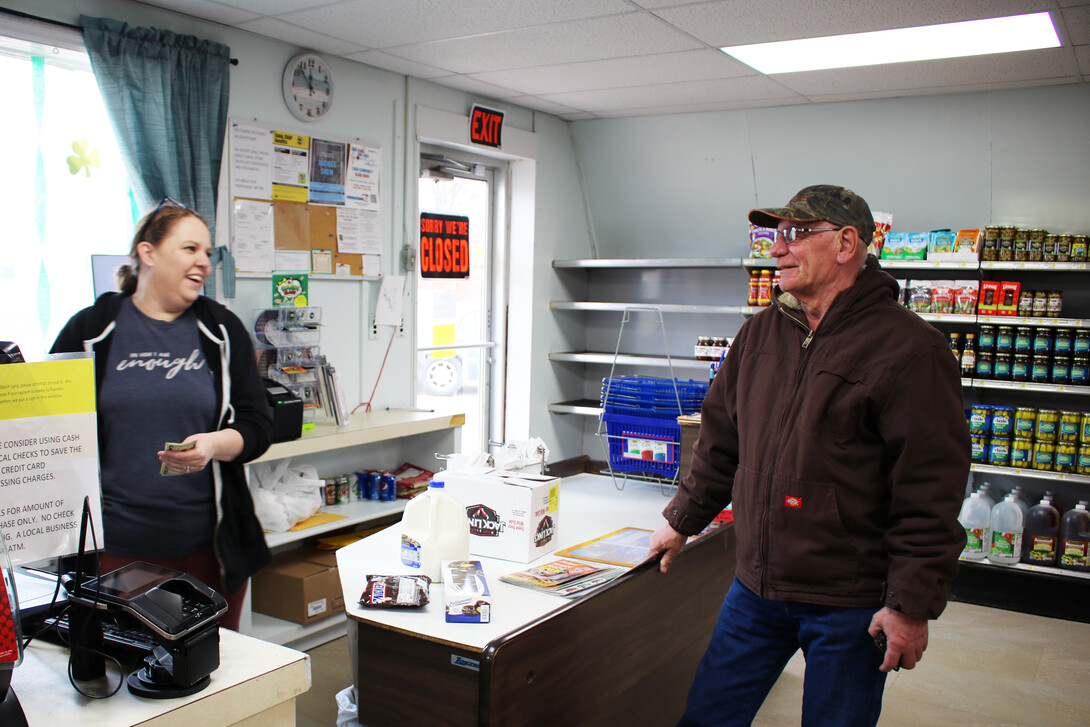
Lincoln, Neb. —According to the USDA, a “food desert” is any rural community more than 10 miles from its nearest food retailer. In early 2020, Lynch became a food desert when its only grocery store closed. In a community where the closest stoplight is 45 miles away, locals didn’t want grocery shopping to become a road trip. So they decided to make some changes.
Lynch resident Martha Nelson contacted Charlotte Narjes, a Rural Prosperity Nebraska Extension Educator and the associate director of the Nebraska Cooperative Development Center, and asked about a creating co-op grocery store.
Fast forward two years. Lynch’s Valley Foods Cooperative opened its doors on Feb. 2 and is hosting its grand opening this Saturday, March 26, at 416 Hoffman St., 10 a.m. to 5 p.m. Free coffee and donuts will be served, and visitors are encouraged to stay for a drawing to win gifts cards to the store.
“We’ve had good community support,” said David Barnes, a member of the co-op committee and store general manager. “Ninety percent of the people who bought into the store have been in, [in the first month],” plus shoppers from neighboring Spencer and as far away as Butte.
A model where multiple people own a business, “a cooperative is a one-vote-per-person entity,” said Narjes. “It benefits the owners, and you’re also using it. You’re investing in quality of life.”
While the process of creating a co-op is straightforward, it’s also extensive. That’s where Narjes, Rural Prosperity Nebraska and the cooperative development center team come in. Funded by a $200,000 Rural Cooperative Development Grant, of which the cooperative development center has received 21 out of the last 23 years, educators like Narjes have the expertise and resources to help communities navigate this process.
In Lynch, the co-op steering team worked with Narjes to conduct an interest survey among residents, compare co-op and LLC business models, connect with a cooperative law attorney, file the banking and finance paperwork, and apply for state certification.
In short, when opening a co-op, “you have a lot of decisions you have to make,” said Narjes.
Not just about food supplies, but about share prices, stocks, distribution, and what to do if a part-owner moves away, for example. That doesn’t count remodeling the space either, for which Lynch residents volunteered their time to put in new flooring and lighting, paint, refinish the shelves, and install new coolers and freezers.
“It takes a village to raise a child,” said Jamie Fisher, a member of the co-op committee, “and it takes a community to raise a grocery store.”
While the to-do list might seem daunting, Narjes said it’s not impossible. Hay Springs opened a co-op in June 2021, and Emerson and Bayard are opening co-ops this summer and autumn, respectively.
One of Lynch’s biggest challenges was receiving regular food deliveries within their budget. Distributors like Associated Wholesale Grocer charge a distribution fee, and for supermarkets that receive large and regular deliveries, the fee is a fraction of the total cost. For small stores, however, that cost can be prohibitive. So Valley Foods played to its geographic advantage to cut costs while still providing quality foods for its customers.
“Lynch happens to be by a Niobrara store, and their truck had room on it for another store,” said Mike Herrod, a representative from Associate Wholesale Grocer. “[The delivery] was advantageous to both parties.”
“They’re really thrilled,” said Narjes about Lynch residents. “Because they were able to partner with [a wholesaler], they have a variety in groceries, and people can come and get everything they need.”
Their stock includes local foods as well—eggs, barbecue sauce, jams, salsas and even bagel bites from local producers, plus a few prepared foods such as salads. A fully-stocked kitchen is in the works, and Lottery tickets are also sold.
“We’ll have everything there that we wanted to offer,” said Barnes.
Individual shoppers aren’t the only ones benefitting from Valley Foods. The local bowling alley, elementary school and hospital all serve food purchased from the store. The co-op also participates in the SNAP program for low-income families. And in early March, the League of Human Dignity purchased $300 in gift cards.
The store really has become a community hub, a cooperative in spirit and practice. That’s no more apparent than on delivery day. Volunteers mingle around the coffee pot, and the minute the truck arrives, they spring into action, unloading, unpackaging and stocking shelves. One Lynch resident was driving to Spencer, saw the delivery truck going toward Lynch, turned his car around and went to the store to help unload.
For lack of a better word, that kind cooperation is what makes it all work, said Narjes. “You have to have that dedication in these small towns. That was one of the things that was really impressive. In that town of 245, they have over 90 owners. It’s amazing.”
“Plus, Dave always has the coffee on,” said Paul Fisher, a member of the co-op committee, “so it’s a good place for that, too.”
You can find additional information at the Valley Foods Cooperative website.
For more information about Rural Prosperity Nebraska, visit the website.
For more information about cooperatives, visit the Nebraska Cooperative Development Center website.
Russell Shaffer | Rural Prosperity Nebraska







